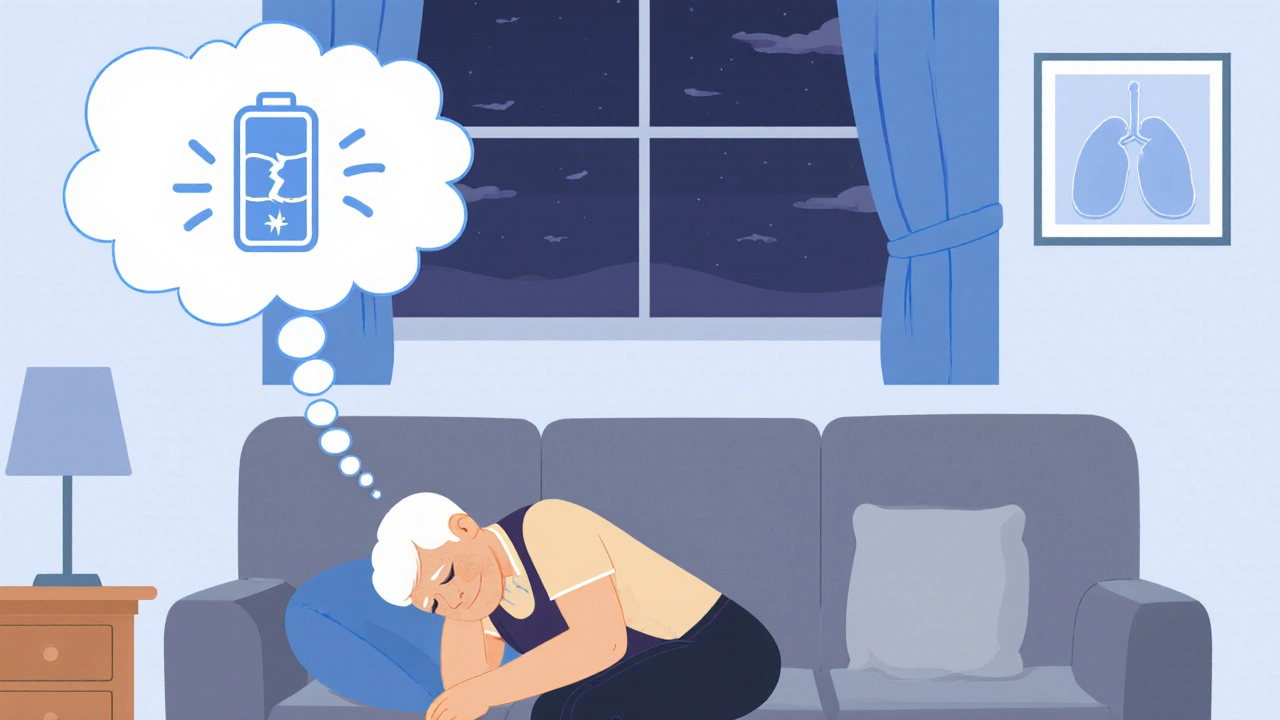COPD Fatigue: Understanding the Causes and What You Can Do
When you have COPD fatigue, a relentless exhaustion linked to chronic obstructive pulmonary disease that makes even simple tasks feel impossible. It's not just being sleepy—it's your body running on empty because your lungs can't keep up. People with COPD often say they feel like they're breathing through a straw while carrying a backpack full of bricks. This isn't laziness. It's biology.
Chronic obstructive pulmonary disease, a group of lung conditions including emphysema and chronic bronchitis that block airflow and make breathing hard forces your body to work harder just to get oxygen. Every breath takes more effort, burning calories you don’t have. Your muscles, especially in your legs and arms, start to weaken from lack of use and oxygen. That’s why walking to the kitchen or climbing stairs leaves you wiped out. And it’s not just your lungs—your heart has to pump harder too, adding more strain. This constant fight drains your energy reserves faster than normal.
Then there’s the sleep problem. Many with COPD wake up gasping or can’t sleep deeply because of coughing or low oxygen. Even if you sleep eight hours, you’re not resting properly. Add in anxiety about running out of breath, and your nervous system stays stuck in high gear. No wonder you feel exhausted all day. Some people mistake this for aging, but it’s not normal to feel this drained. It’s a signal your body needs support.
Breathing difficulty, the core symptom of COPD that triggers a chain reaction of energy loss, muscle weakness, and mental fatigue doesn’t just affect your lungs. It changes how your whole body functions. When oxygen levels drop, your brain tells your muscles to slow down to conserve energy. That’s why you stop moving—not because you don’t want to, but because your body forces you to. Over time, this leads to muscle loss, which makes breathing even harder. It’s a cycle that gets worse without intervention.
What helps? Pulmonary rehab programs teach you how to breathe smarter, not harder. Simple pacing—breaking tasks into smaller steps—can save energy. Oxygen therapy, if prescribed, can make a huge difference. Even light walking, done regularly, builds stamina over time. Nutrition matters too: eating too much or too little can make fatigue worse. You need enough protein to keep muscles strong, but not so many carbs that you produce too much carbon dioxide. And don’t ignore mental health—depression and COPD fatigue often go hand in hand.
You’re not alone in this. Thousands live with COPD fatigue every day, and many find ways to regain control. The posts below cover real strategies: how certain medications affect your energy, why some supplements help (and others don’t), what kind of shoes reduce breathlessness while walking, and how to sleep better despite lung issues. These aren’t theory—they’re what people have tried and tested. You don’t have to accept feeling this tired. There are steps you can take today to feel stronger tomorrow.
Explore how tiotropium bromide can reduce fatigue and boost energy in COPD patients, backed by studies, practical tips, and safety guidance.
Oct, 19 2025

